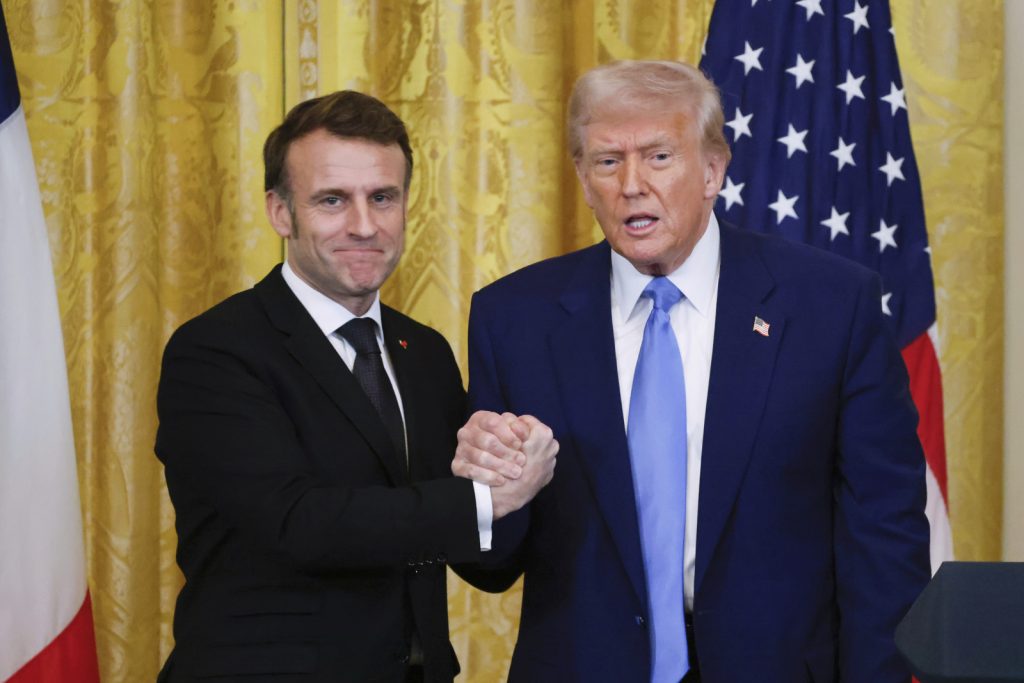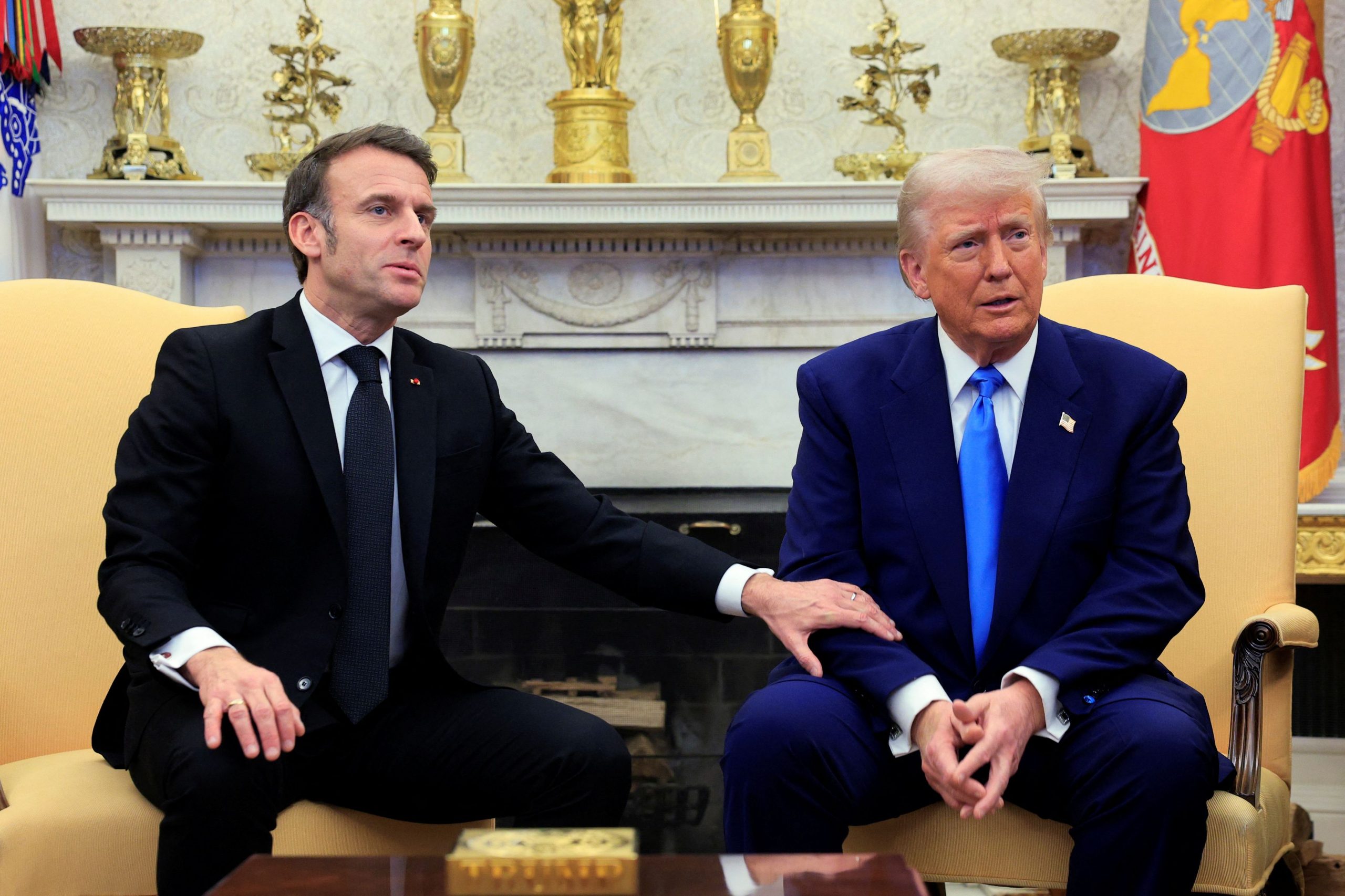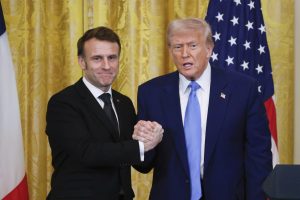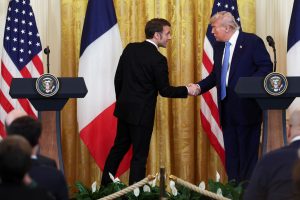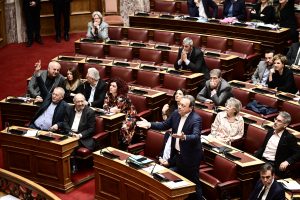WASHINGTON—When French President Emmanuel Macron visited Washington this week, President Trump invited him earlier than scheduled into the White House, where the two men talked alone for over an hour.
Macron pressed Trump to provide a U.S. military “backstop” for the thousands of troops that the U.K. and France are willing to deploy in Ukraine in the event of a peace deal the U.S. is negotiating with Russia , a senior official said. They didn’t get into the details, the official said, but Trump was open to the idea and Macron left Washington believing he had an understanding with Trump.
“We work very well together,” Macron said later as he sat down with Trump in the Oval Office before a cluster of reporters.
Trump’s drive to negotiate a swift end to the war in Ukraine , and his desire for rapprochement with Russia, has leaders across Europe trying their hand at a skill they consider vital to the Continent’s security: Trump whispering.
Trump whispering is a practice that takes many forms—flattery, reverse psychology and pomp—but its ultimate aim is to guide him toward your foreign-policy goals. Politicians who pride themselves on Trump whispering say it starts by understanding his transactional instincts.
Framing geopolitical issues in real-estate terms is one technique. So is appealing to Trump’s sense of status among world leaders. During Trump’s first term, Macron invited him to Bastille Day celebrations in 2017, making him the guest of honor at France’s annual military parade. The gesture spawned an initial bromance between the men that was expressed in backslaps, hugs and air kisses. Disagreements over Iran and other issues, however, clouded the relationship later in Trump’s first term.
Outside of Europe, Mexican President Claudia Sheinbaum charmed Trump, and temporarily avoided tariffs , by offering 10,000 troops to guard the U.S.-Mexico border last month. Israeli Prime Minister Benjamin Netanyahu flattered Trump this month at the White House, calling him “the greatest friend Israel has ever had.”
A procession of dignitaries has arrived in Washington in recent days—on a mission to charm, cajole and ultimately persuade Trump that he is about to commit a historic error in siding with Moscow against the interests of Ukraine and its European allies. It isn’t quite clear if whispers are working.
Over the weekend, Andrzej Duda , the Polish president, got 10 minutes of face time with Trump after hustling across the Atlantic for an audience. Thursday will be British Prime Minister Keir Starmer’s turn. To prepare, the U.K. government announced the biggest military-spending rise since the Cold War.
Though Macron believes he has an understanding with Trump, a White House official said the peace agreement that Trump is forging won’t include a guarantee of future aid for war or any commitments to send U.S. personnel into the region.
Much is at stake for Europe. Trump’s decision to press for a rapid peace in Ukraine risks playing into Russian President Vladimir Putin’s hands and upending 80 years of trans-Atlantic security ties that have been a guarantor of relative peace worldwide.
On Monday, Trump and Macron’s meeting transpired after a videoconference with Group of Seven leaders, according to the senior official. It isn’t clear what approach Macron took in the one-on-one meeting. But in a livestream days before the meeting, Macron, in what was essentially a rehearsal, said he would tell Trump: “You can’t be weak with President Putin. It’s not you. It’s not your brand.”
Later on Monday, Trump and Macron were joined by cabinet members and reporters in the Oval Office, where Trump was swiftly asked whether the U.S. was ready to back a European peacekeeping force.
“We’re going to have a backing of some kind. Obviously the European countries are going to be involved. I don’t think you’re going to need much backing,” Trump said.
Macron took the thinking one step further during a news conference with Trump later in the day.
If Moscow violates an eventual peace deal, Macron said, Russia would “enter into a de facto conflict with all of us engaged in the peace process.” He added: “That’s the real break. It’s having something solid with the American deterrent capacity.”
The next person to try his hand at wooing Trump is set to be Britain’s Starmer, a low-key former human-rights lawyer turned left-wing politician who is probably Europe’s most unlikely Trump whisperer.
His aides are hoping that a combination of warm words, promises of more military spending and shared British-American history can help him persuade the U.S. president to adjust his course.
While announcing Britain’s increase in military spending on Tuesday, Starmer even called for “peace through strength,” a preferred Trump catchphrase. The British prime minister will also be dangling the prospect of a state visit to the U.K. for Trump with the royal family, whom the president admires.
The plan to deploy European forces in Ukraine is designed in part to appeal to Trump’s transactional nature. Both the U.K. and France are promising to put “skin in the game” in Ukraine by sending in a peacekeeping force so the U.S. won’t have to.
Whispering in Trump’s ear can be a high-wire act. Leaders have to strike the right balance between flattering the leader of the world’s most powerful military and picking the right moment to stand their ground. That dynamic was fully on display Monday as Macron sat down in the Oval Office with Trump.
Trump, surrounded by senior cabinet members, said European aid to Ukraine was in the form of loans that Kyiv was on the hook to pay back—an assertion Trump has used to argue the U.S. deserves to be compensated for the billions in aid it delivered to Ukraine under the Biden administration.
Europeans “get their money back,” Trump said.
Macron interjected: “To be frank, we paid. We paid 60% of the total defaults” on Ukraine’s loans, adding that European aid to Ukraine also included grants.
Trump smiled ruefully and waved his hand in the air, indicating he didn’t agree.
On Monday, Trump recalled that, on his 2017 trip to France, Macron and his wife treated the president and first lady Melania Trump to dinner inside the Eiffel Tower. The dinner conversation didn’t include an interpreter, Trump said.
Macron “was going on and on and on. I was just nodding: yes, yes, yes,” he said.
Trump recalled returning home to find accounts of the conversation in newspapers that didn’t align with his own memory of the exchange, implying that Macron was behind the leaks.
“He really sold me out,” Trump concluded with a look of begrudging amusement. The men then laughed off the moment, pawing at each other affectionately and finishing with an awkward handshake.
“He’s a smart customer. I’ll tell you that,” Trump added.
